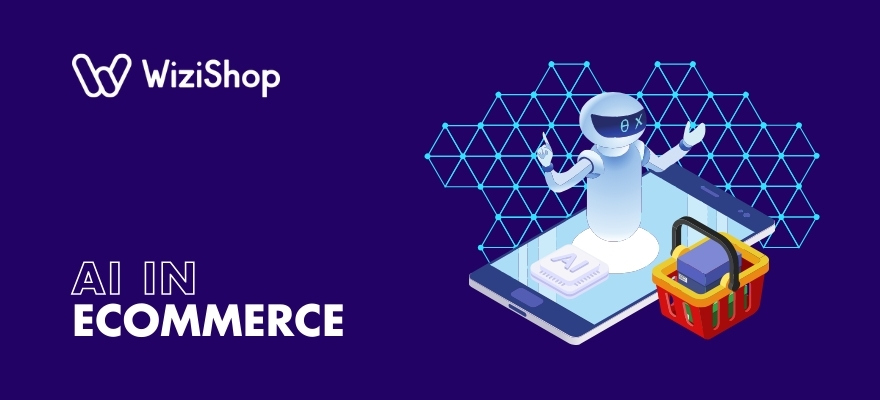As ecommerce continues to evolve at a breakneck pace, artificial intelligence (AI) has stepped into the spotlight, transforming how we shop online. From personalized shopping experiences to lightning-fast customer service, AI isn't just a new trend in tech; it’s the backbone of modern internet commerce.
In this article, we dive into the dazzling world of AI in ecommerce, exploring its pivotal role and shedding light on both its shimmering potentials and the challenges it brings. Get ready to uncover how AI is reshaping the online shopping landscape, making every click and scroll smarter than ever before!
How is artificial intelligence used in ecommerce? 9 Examples
Artificial intelligence has become a powerful tool in the ecommerce sector, enhancing various aspects of the industry from operations to customer engagement. Here are some of the most prominent applications of AI in ecommerce today, also demonstrating how this advanced technology is set to impact future ecommerce.
1. Personalized shopping experiences
By examining a user’s browsing behavior, purchase history, and search patterns, AI algorithms can predict customer preferences and needs with remarkable accuracy. This enables you to offer personalized product recommendations and customized promotions that resonate with individual shoppers.
For instance, when a customer shops online, AI employing machine learning can dynamically display products they are more likely to buy, based on their past interactions. In addition, artificial intelligence can interpret the text and images used by online shoppers to align them with the products they're searching for with the help of natural language processing (NLP).
Consider also when you see features like "People also purchased" or "Customers also viewed" when you're viewing a product page on your favorite store's website... Yep, personalization driven by AI, one of the major ecommerce innovations of today, is working behind the scenes here as well! This allows the retailer to avail of cross-selling or upselling techniques, recommending additional items that match in terms of size, color, shape, fabric, brand, etc., to increase average order value.
2. Chatbots and virtual assistants
Today's consumers have a vast variety of options from which to choose when it comes to shopping on the internet. In order to keep up with (or stand out from) your competition, being able to supply fast and responsive customer support is a must!
AI chatbots and virtual assistants provide 24/7 customer service, handling inquiries, providing product recommendations, and assisting with transactions. These tools can mimic human conversation, improving engagement and customer satisfaction.
Chatbots and virtual assistants, well-known examples of artificial intelligence, are capable of managing a broad array of customer interactions, from responding to product questions to processing orders and extending personalized promotions. By automating routine transactions and gathering customer data, these AI tools enhance customer communication and lessen your company's dependency on human staff.
3. Inventory management
If your product catalog doesn't currently include a long list of items for sale, managing your inventory might not take up a lot of your time and energy at the moment. However, as your ecommerce business grows, you will likely find that this task becomes increasingly demanding.
AI technology can facilitate this critical element of running an online store by employing advanced predictive analytics, surpassing traditional methods of monitoring current stock levels and overseeing the supply chain. Availing of machine learning, companies can precisely predict the necessary inventory levels to order and maintain.
In addition, AI-powered inventory management can automate the replenishment process by syncing with suppliers to guarantee prompt restocking. Artificial intelligence can also be used to predict transit times and potential shipment delays, allowing for timely updates to be shared with the consumers who purchase from your ecommerce website.
4. Optimized pricing
Regardless of what products you sell online, determining what prices to charge for your offerings can get tricky. Artificial intelligence can make this task much easier by employing dynamic pricing models that adapt to market conditions in real time.
AI algorithms analyze elements such as competitor pricing, customer demand, inventory levels, and seasonal trends in real-time to adjust product prices dynamically. They can then automatically adjust product prices to maximize profitability and competitiveness. With AI-powered dynamic pricing, prices might increase when demand is high or when competitors are out of stock, for example, and decrease to attract more buyers during slower periods.
This application of artificial intelligence is also quite beneficial for multichannel retailers looking for greater versatility in their pricing strategies. Utilizing AI, retailers can adjust prices across different sales channels based on demand fluctuations.
5. Fraud detection and prevention
While fraud has been present since ecommerce first entered the scene, it's increased significantly with the boom in online shopping. According to Statista data, in 2022, global ecommerce experienced an estimated $41 billion in losses due to online payment fraud, an increase of an astonishing 105% from 2021.
Artificial intelligence can aid in both detecting and preventing fraud on your ecommerce website by analyzing large volumes of transaction data to identify suspicious patterns and potential fraud. These AI systems can start to recognize anomalies such as unusual purchase sizes, frequency, and payment methods that might indicate fraudulent activities, improving security for both your ecommerce business and your customers.
What's more, the AI will be able to adapt and improve over time, continually refining its ability to detect new and evolving fraud techniques, thus keeping your online store secure and maintaining customer trust.
6. Generative AI tools
Generative AI refers to artificial intelligence technologies that can generate new content, from text and images to music and code, based on the patterns and data it has learned. Tools such as ChatGPT and DALL-E leverage generative AI to automatically produce text, images, and other forms of media from given prompts, assisting with numerous AI business ideas, such as content writing, translation, and others.
In ecommerce, this technology aids in simplifying content production, customizing marketing materials, and refining brand communication. For instance, generative AI in ecommerce is capable of crafting product descriptions, composing marketing emails, and evaluating brand communications and positioning. Copywriters can feed a marketing email into a generative AI tool, which then tailors it for various customer demographics.
This AI capability enhances user engagement through personalized content and improves operational efficiencies by automating repetitive creative tasks, significantly enhancing the shopping experience and backend operations.
7. Customer sentiment analysis
As an ecommerce entrepreneur, obtaining valuable evaluations from customers will be crucial for improving your ecommerce website and growing your business. By analyzing reviews, social media messages, and customer feedback, AI can gauge customer sentiments and preferences.
With the help of NLP, AI tools can detect and interpret emotions and opinions expressed in text, providing insights into how customers feel about products, services, or the brand overall. These insights enable businesses to identify strengths and areas for improvement, tailor marketing strategies, and address customer concerns proactively.
Furthermore, AI-driven sentiment analysis helps in segmenting customers based on their sentiments, allowing for more personalized communication and promotions to best suit the needs of the shoppers you want to reach, which can lead to improved customer satisfaction and loyalty, and ultimately, increased sales.
8. Supply chain and delivery optimization
Another important application of AI in ecommerce is that AI can optimize logistics and supply chain operations by enabling more efficient and accurate operations. Utilizing predictive analytics, AI helps forecast demand, manage inventory levels, and plan adequate stock to prevent both overstocking and stockouts.
AI algorithms also optimize routing and logistics, calculating the fastest and most cost-effective delivery routes. This not only reduces shipping times but also lowers operational costs. In addition, AI can predict potential disruptions in the supply chain, such as delays from suppliers or logistical challenges, allowing ecommerce businesses to proactively manage and mitigate these issues.
By integrating AI into supply chain management, your business can ensure smoother operations, timely deliveries, and improved customer satisfaction.
9. Marketing automation
Having excellent marketing strategies in place is essential whether you are just starting out in web commerce or are an experienced ecommerce entrepreneur wanting to take your business to even further. Technology involving AI can automate your marketing campaigns, making your efforts in this area all the more efficient and effective.
Through the analysis of customer data, AI identifies patterns and preferences, enabling the creation of targeted campaigns that resonate with different customer segments. AI tools can automate the distribution of these campaigns across various channels such as email, social media, and online ads, ensuring optimal timing and frequency to maximize engagement and conversions.
What's more, AI continuously learns from campaign performance data, allowing for real-time adjustments and optimizations. This not only improves the effectiveness of marketing efforts but also reduces the manual workload, enabling marketers to focus on strategy and creative development.
Benefits of using AI in ecommerce
The exciting world of ecommerce is always changing, with e-retailers having to frequently re-evaluate their current strategies in order to adapt to growing competition and evolving trends. With the introduction of AI technology, though, you'll get to enjoy numerous benefits to help support your efforts and make running an ecommerce business easier and more enjoyable than ever before.
Enhanced customer experience
Artificial intelligence personalizes shopping by analyzing customer data to offer tailored recommendations and promotions, enhancing the user experience. Furthermore, AI tools like chatbots and virtual assistants provide round-the-clock customer service, handling inquiries and issues promptly, which significantly improves customer satisfaction and loyalty.
Increased operational efficiency
AI in ecommerce streamlines operations by automating tasks like inventory management and order fulfillment. It predicts stock needs, optimizes warehouse logistics, and manages supply chains efficiently, reducing delays and errors. This automation not only cuts costs but also speeds up the entire process, boosting operational efficiency.
More sales
AI-driven insights enable ecommerce businesses to refine their marketing strategies by identifying key customer trends and preferences. This targeted approach strengthens the relevance of ads and promotions, leading to better engagement and higher conversion rates. These optimized marketing efforts can consequently directly contribute to increased sales.
Riskes of using AI in ecommerce
While AI technology brings a host of advantages that simplify and enhance operations, it also raises several concerns that e-retailers must address. As we integrate AI deeper into ecommerce processes, it's crucial to explore these challenges to ensure sustainable and responsible use of the technology.
Privacy and data security
AI systems require vast amounts of personal data to function, which, if improperly managed or secured, can lead to unauthorized access and exploitation, endangering consumer privacy and trust. Concerns about consumer data privacy and security in AI applications arise from the potential for misuse and breaches. In fact, according to data presented by Statista from Microsoft's Global Online Safety Survey 2024, which surveyed approximately 16,800 people in 17 countries, 62% of respondents declared that they were very or somewhat worried about data privacy issues with AI.
High implementation costs
Another challenge of AI in ecommerce is that integrating advanced AI technologies often involves significant financial investment. Costs can include purchasing AI software or platforms, upgrading existing infrastructure, and training staff. Continuous maintenance and updates to AI systems also contribute to ongoing expenses, making it a considerable but potentially rewarding investment for businesses.
Dependency and error potential
AI algorithms, while powerful, may propagate biases or inaccuracies if based on flawed data, leading to potentially costly mistakes. In addition, excessive dependence can undermine human oversight, increasing the impact of these errors. Over-reliance on AI systems can pose risks such as operational vulnerabilities and decision-making errors, leading to shoppers losing trust in your brand.
WiziShop: The AI-powered solution for your online store!
Artificial intelligence in ecommerce is revolutionizing how businesses interact with customers, manage operations, and market products. As an online retailer, harnessing the power of AI will allow you to provide personalized experiences, optimize supply chains, and enhance marketing strategies, ultimately leading to increased efficiency and growth in the competitive online marketplace.
If you're thinking of getting started in internet commerce, it makes sense to choose an ecommerce platform that understands the how much of an asset AI is for today's online sellers. This is where WiziShop, the best ecommerce solution on the market, comes in!
When you create your online store with WiziShop, you'll have access to not just an extensive library of design templates, a helpful team of Business Coaches to answer any queries you may have concerning your website, 50+ SEO features, dedicated training, and 400+ tools to boost your conversion rate, but also WiziShohp's powerful artificial intelligence.
WiziShop's AI offers a range of tools that can greatly enhance the efficiency and effectiveness of online store management. The AI facilitates rapid content creation, making it possible for you to generate product pages up to 12x faster by automating tasks like photo optimization, writing SEO-optimized descriptions, and creating catchy hooks to stimulate purchase desire.
Moreover, WiziShop's AI includes Maia, a personal assistant available 24/7, designed with extensive ecommerce experience to provide comprehensive support in managing and setting up your online store.
The AI also aids in creating a unique brand identity, suggesting profitable product niches, store names, domain names, and impactful taglines tailored to your target audience. Furthermore, it supports marketing efforts by generating quality content for blogs and managing social media posts and ads across platforms like Facebook, Google, and TikTok, optimizing engagement and visibility.
WiziShop's AI tools offer unlimited access to these capabilities, making the latest AI innovations accessible to all users, which can significantly boost your ecommerce operations and sales growth.
Get started with your AI-powered adventure in ecommerce today by trying WiziShop free for 7 days.
Try WiziShop free for 7 days
THE EASIEST NO-CODE ECOMMERCE SOLUTION✅ No credit card required
✅ Access to all features
✅ No commitment
WiziShop is also proud to offer e-merchants its newest AI innovation: the Pizi mobile application! This handy tool will help you create high-quality, professional product pages from scratch in a single click.
Start by simply taking a photo of your product with your iPhone or other smartphone. Pizi will then take care of removing the background from the photo, inserting the product in front of a white background or even in a setting adapted to the offer. It also handles the writing of the entire product listing, including titles and descriptions, also suggesting the best price for the product in question.

Great news: as a WiziShop user, you'll get unlimited access to Pizi, allowing you to automatically import the product page onto your site and generate as many product pages for your online store as you'd like!
AI in ecommerce FAQ
Why do we need AI in ecommerce?
The short answer? We don't! Technically speaking, of course. Just like with other kinds of technologies, AI comes with both advantages and advantages, leaving many e-retailers to wonder if it's worth integrating into their businesses.
You've likely watched video content and read other articles about numerous risks associated with AI in general, not just associated with web commerce, and people are right to voice their concerns over an ever-evolving form of technology.
That being said, when used responsibly, AI-based tools can help skyrocket your business's operational efficiency; save you loads of time; and improve the shopping experience for your customers with smart search features, personalized product recommendations, and more.
What skills are required to effectively implement AI in an ecommerce setting?
Effectively implementing AI technology for your ecommerce business requires a mix of technical and analytical skills.
Technical skills are beneficial for developing and managing AI systems, including proficiency in programming languages like Python, and an understanding of machine learning frameworks. Analytical skills are essential for interpreting the data that AI uses and generates, enabling teams to make data-driven decisions.
Beyond these skills, it’s important for practitioners to understand the specific capabilities and limitations of AI within ecommerce contexts. This includes knowing how AI can enhance customer interactions, optimize logistics, and facilitate marketing personalization, while also recognizing the ethical considerations and potential biases in AI models.
What is the best AI tool for an ecommerce business?
These days, ecommerce businesses have a plethora of AI tools at their fingertips! Choosing the best AI tools for your ecommerce business involves assessing several key factors.
First, identify your specific needs and challenges to determine which aspects of your operation could benefit most from AI, such as customer service, inventory management, or marketing. Next, evaluate the integration capabilities of AI tools to ensure they can seamlessly work with your existing ecommerce platform and data systems.
You'll also want to consider the scalability of the tools to accommodate your business's growth. Lastly, assess the support and training that the tool providers offer to help you maximize the technology effectively. By considering these factors, you can select AI tools that align with your business goals and operational requirements.
Remember that when you sign up to use the WiziShop ecommerce platform, you'll automatically get unlimited access to our revolutionary AI, allowing you to generate product descriptions, translations, ad copy, blog articles, and other kinds of text content in the blink of an eye. Plus, as this tool is accessible directly form your administration area, you don't have to waste time searching for third-party integrations!










